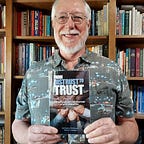Spiritual Awareness, Attuning, and Intuition
Facilitating spiritual intelligence, insight, and holistic optimal functioning
Our whole self includes our spiritual self/aspect, which can be developed with increased awareness, attunement, insight, and practice that develops our spiritual intelligence, compassionate actions, and ability to function optimally as a whole person.
It starts with humility — knowing that I am not the ultimate or highest being and there is an active force that we can call the universal life force, which Western Christians have named GOD or as written in the Torah, “the great ‘I am’.” Then we are free to imagine aspects of the invisible, greater force/higher power in whatever form or by whatever name we choose, but we must recognize that it is greater than any human — greater than ourselves.
We can also benefit from seeing that universal life force as having our own, personal best interest at heart. We can humanize that eminent power by metaphorically identifying the divine as a person, a deity, and/or the divine universe.
Humility is a requirement for spiritual advancement because it requires us to see ourselves as equal to other humans — no better than, no worse than. Thus, we value equality in comparing self to all others (“all” meaning all). With humility, we can engage others on a deeper and more meaningful level, which will enhance our communication, relationships, and abilities to collaborate and succeed in our material endeavors.
Relationships are everything. To be optimally functioning, we must open our whole self to hearing the experiences, needs, abilities, strengths, weaknesses, and beliefs/values of the other before we can be truly, compassionately, in a helpful/useful relationship with them. When we do that compassionate listening, then we too are spiritually blessed as we are advancing our spiritual intelligence. The challenge is to turn toward our conflicts, differences, and difficulties with nonjudgmental awareness and compassion as we relate to others.
We must be an active participant in our every relationship and practice tolerance and forgiveness to shine our light as a humble servant — equal to and yet the servant of others. Competitive jealousy, for example, “I am better than him/her/them…” is envy, rotten envy, which greatly impedes spiritual development. We must have a humble, grateful heart to receive peace and live peacefully with those we contact in our everyday lives.
Essential ingredients for building trust in human relationships include interpersonal relationality and its incumbent acceptance, friendliness, inclusion, and hospitality. This requires clear, meaningful, accurate, and effective interpersonal communication. It includes listening with empathy, which is more important than speaking in building a trusting relationship. For more specifics on this, see my “Synergistic Communication Guidelines.”
Although we can hone our spiritual self in isolation, that is constricted by our own limited experiences, awareness, understanding, and imagination. Thus, spiritual development usually is facilitated better with a trustworthy companion, guide, guru, and/or teacher. With a mentor or guide, one can benefit from the experiences, knowledge, and inspiration of others.
Compassionate spiritual and religious traditions (practices) and scriptures — inspired holy words that reveal others’ experiences in spiritual development in relationship with the divine — also can have great utility in regard to developing our spiritual intelligence.
However, spirituality is of little value without compassionate behaviors attached. Spirituality must be lived out with love, kindness, and compassionate actions. When in doubt in any human endeavor, loving-kindness is always the right approach for action plans. When an attuned, compassionate heart sees differences, difficulties, struggles, or pain in others, then compassionate action is loving the other as yourself. Compassionate actions that act out generous loving-kindness toward others are affirmed by many religions.
Follow The Orange Journal so you don’t miss a post. Do you love to write about self-improvement and personal development? Learn how to be added as a writer here. 🍊
